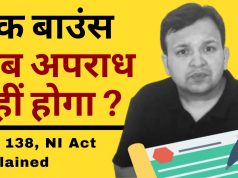A non-payment is a serious offence in India punishable with imprisonment.
CHEQUE BOUNCE NOTICE
A Cheque bounce or a cheque non-payment is a serious offence in India punishable with imprisonment or fine under Section 138 of the Negotiable Instruments Act, 1881. A Cheque beneficiary must present the cheque issuer a notice under Section 138 within 30 days of the return of cheque to protect his/her rights under the Act. The Section 138 notice usually contains reference to Section 138 of the Act, information about when the cheque was presented, the reason for non-realization of payment and a request to the cheque issuer to arrange for payment through alternate means.
Fill the Information Form
Provide required Documents.
FAQ
1. What is a Cheque?
A Cheque is a bill of exchange drawn upon a specified banker & not to be expressed to be payable otherwise than on demand.
2. What are the essential characteristics of a Cheque?
- It has to be in writing. • It has to be an unconditional order. • Banker has to be specified. • Payment should be directed to a specified person. • It should be payable on demand. • It should be for a specific some of money. • Should have the signature of the drawer.
3. When a Cheque is considered to be bounced?
- Signature is not matching • There is overwriting in the cheque • Cheque was presented after lapse of six months, i.e. after the cheque has expired • Account was closed • Insufficient funds in the account • Payment stopped by the account holder • Opening balance insufficient • Disparity in the words and figures mentioned on the cheque • In case the cheque is issued by a company, the same does not bear the seal of the company • Mismatch in account number • In case of joint account where both signatures are required, only one sign is there • Death of the customer • Insolvency of the customer • Insanity of the customer • On the order of the garnishee • Crossed cheque • When a cheque is issued against the rules of trust • Alteration in cheque • Doubt in genuineness of the cheque • Presented at the wrong branch • Crossing limit of overdraft (OD)
4. What are the essential ingredients for an offence under Section 130 of the Negotiable Instruments Act, 1881?
- A person must have drawn a cheque on a bank account maintained by him. • The cheque should have been issued in discharge, in whole or in part, of anydebt or other liability. • The cheque has been presented to the bank within the period of its validity. • The cheque is returned by the bank unpaid, either because of fundsinsufficient or it exceeds the amount arranged to be paid. • The payee makes a demand for the payment by giving a notice in writing,within 30 days of the receipt of information by him from the bank. • The drawer fails to make payment of the said amount of money within 15 daysof the receipt of the said notice. • Complaint is made within one month of the date on which the cause of actionarises.
5. What are the other implications of a Cheque bounce?
Besides criminal offence, bounced cheques can also impact credit worthiness or credit history. Also both the Nationalized banks and NBFC’s require the customer to furnish the bank statement for a period of up to 1 year for any loan processing; occurrence of many cheque bounces in a bank statement can affect loan eligibility and credit worthiness.
6. How to avoid Cheque bounces?
The best policy to avoid cheque bouncing is to ‘Never write a Cheque to anyone without money in your account’. Providing a cheque to a person is a firm financial commitment you make to the person, which has a lot of responsibilities and implication in case if it is not honoured.
OUR SERVICES
Company Registration I Trademark I Copyright I Patent I GST I MSME
ISO Certification I Website/App Policy I Legal Documentation
Annual Compliance I Connect Consultant
Visit: Aapka Consultant to get Online Services of CA CS & Lawyers.












